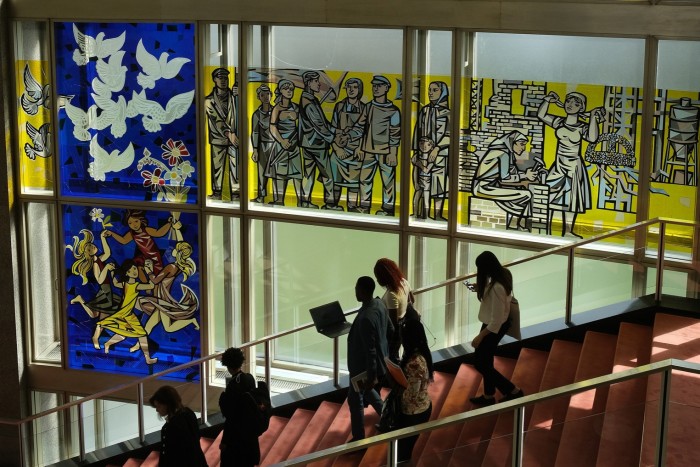How business schools can help tackle the biggest problems

Roula Khalaf, Editor of the FT, selects her favourite stories in this weekly newsletter.
Business schools play an important role in the business world, shaping the world view of the next generation of leaders and sharpening the thinking of top executives and policymakers through their research. So, with the corporate world showing growing concern for sustainability and climate change, it is appropriate to ask: what are business schools doing to contribute to this agenda?
The answer is that they should be putting purpose and problem-solving at the heart of their teaching, so future business leaders are equipped to tackle society’s greatest challenges. This is the conclusion of a recent British Academy initiative I co-chaired with Professor Colin Mayer at the University of Oxford’s Saïd Business School, which concluded with the report Teaching Purposeful Business in UK Business Schools, published in November.
A central message of the report is that society faces a number of almost intractable challenges, including climate change, resource shortages, inequalities within and between countries and geopolitical fragmentation. Companies have long been seen as part of the problem, but have woken up to the chance to become a force for good. Most have made net zero pledges on carbon, and many have made commitments to the UN Sustainable Development Goals. Balancing the needs of people, planet and profit is now part of the agenda in corporate boardrooms everywhere.
Another core theme of the report is that students learn best by applying their knowledge to real-world problems. Working towards a business degree will always involve factual information acquired through reading, listening and classroom-based discussion. But it should be complemented with experiential learning — the cycle of experimentation, evidence-gathering and reflection through which deep insight and expertise are achieved.
European Business Schools Ranking of 2022

See which schools reached our league table of 95 course providers. Plus, read the rest of our coverage here.
Business schools should develop activities that allow students to apply academic insight to practical challenges faced by corporate executives, investors and entrepreneurs as they seek to solve the problem of people and planet in a profitable way. This approach is good for students’ professional development and for society more generally.
Many schools have already made progress towards this action-oriented approach to learning, but with activities often seen as peripheral to the mainstream academic curriculum. We need to put solving societal problems at the heart of the agenda with three key approaches.
First, we must revisit the assumptions underlying business theory. For example, most courses on finance or strategy assume the chief executive’s primary responsibility is to maximise profits for shareholders. There is still a tendency to treat the broader stakeholder perspective as a supplementary idea and to teach the “fundamentals” through a lens of shareholder primacy.
We need to review curricula to ensure such assumptions are opened for debate, rather than presented as indisputable axioms. We recommend offering students a greater breadth of courses than is usual, to provide a richer perspective on the role of business in society and to enhance critical thinking skills.
Second, we need to restructure approaches to student learning. Executives rarely operate in functional silos, and the challenges they face cannot be addressed through a single academic discipline. Tackling a complex problem, such as how to reduce a company’s carbon footprint while growing sales in an increasingly competitive market, needs a different perspective.

An exciting shift would be to make problem-solving the “orienting device” through which students learn. Several business and management schools featured in the British Academy report have built courses, or entire programmes, in this way — for example, around societal “grand challenges” or corporate challenges in diversity and inclusion or sustainability.
This problem-solving perspective does not have to be entirely driven from the top. We have seen many examples of entrepreneurial student-led initiatives, from field trips to workshops to extracurricular courses, helping to fill the gap.
Third, business and management schools should collaborate to build greater legitimacy for the sustainability agenda. Initiatives under way include the UN Principles for Responsible Management Education, the AACSB accreditation agency’s sustainability targets, and the FT’s Responsible Business Education awards. Subscribing to such initiatives helps reinforce the change agenda they embrace.
Why hasn’t all this happened sooner? Compared with many other academic departments, business and management schools have experienced a surge in student numbers, which has given them a licence to keep doing things as before. But the trend is shifting, not just because belts are tightening but because the business agenda is shifting. There is an opportunity for ambitious and progressive business schools to gain advantage by moving quickly. And there is scope for the entire system to move with the times, to help business education become a force for good in the business world.
Julian Birkinshaw is vice-dean of London Business School
Comments